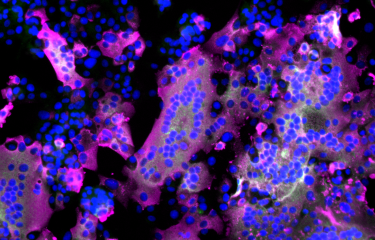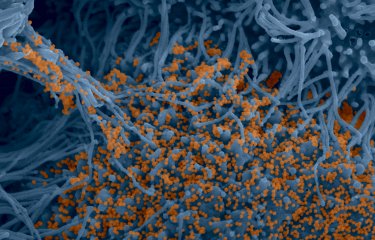From May 23 to August 13, 2021, the Institut Pasteur, in partnership with the French National Health Insurance Fund (CNAM), Santé publique France and the Ipsos institute, conducted the fourth part of the ComCor epidemiological study on circumstances and places of infection with the SARS-CoV-2 virus in France. The aim of the study was to identify the socio-demographic factors, places visited and behaviors associated with a higher risk of infection with SARS-CoV-2. The study was also used to carry out a real-world analysis of the effect of previous infection with COVID-19 and the efficacy of messenger RNA vaccines against symptomatic infection with the Delta variant. The findings were published in The Lancet Regional Health Europe on November 26, 2021.
In the fourth part of the ComCor study, the data of 12,634 individuals who tested positive for SARS-CoV-2 between May 23 and August 13, 2021 and 5,560 non-infected controls recruited over the same period and matched by age, sex, population density, region of residence and week of exposure were analyzed. The recruited individuals completed a self-administered questionnaire. The period under study coincided with the gradual reopening of public places and the emergence of the Delta variant in mainland France. The results describe the circumstances of infection for diagnosed cases of SARS-CoV-2. Of the 12,634 people who tested positive, 8,644 (68%) were diagnosed as having been infected with the Delta variant.
The study also enabled real-life estimations to be made, for France, about the protective effect of previous infection with COVID-19 and the effectiveness of vaccines against symptomatic SARS-CoV-2 infection caused by the Delta variant.
The period under study, from May 23 to August 13, was characterized by the following events :
In the fourth part of the ComCor study, the data of 12,634 individuals who tested positive for SARS-CoV-2 between May 23 and August 13, 2021 and 5,560 non-infected controls recruited over the same period and matched by age, sex, population density, region of residence and week of exposure were analyzed. The recruited individuals completed a self-administered questionnaire. The period under study coincided with the gradual reopening of public places and the emergence of the Delta variant in mainland France. The results describe the circumstances of infection for diagnosed cases of SARS-CoV-2. Of the 12,634 people who tested positive, 8,644 (68%) were diagnosed as having been infected with the Delta variant.
The study also enabled real-life estimations to be made, for France, about the protective effect of previous infection with COVID-19 and the effectiveness of vaccines against symptomatic SARS-CoV-2 infection caused by the Delta variant.
The period under study, from May 23 to August 13, was characterized by the following events :
1/ Circumstances and places of SARS-CoV-2 transmission
The analysis identified indoor bars and private parties as places of transmission of the Delta variant in people aged under 40 between June 9 and July 9, with a higher risk for men than for women. This period coincided with the Euro 2020 football championship, suggesting that supporters gathering together for matches may have played a role in spreading the virus, as was also observed in the United Kingdom. When nightclubs opened, they were also places of transmission.
In people aged over 40, those with children in their household or close circle were at greater risk of infection, with the risk ranging from +30% for middle school children to +90% for very young children (under the age of three).
Certain modes of transport were also associated with a moderate increase in the risk of infection: sharing a car with family and friends (+30%) (excluding car-sharing platforms, for which no increased risk of infection was observed), taxis (+50%), metro (+20%), train (+30%) and flying (+70%).
No additional risk of infection was recorded for cultural venues, shops (excluding local shops), restaurants (it was a period during which many restaurants mainly used outdoor seating areas or well ventilated indoor areas), places of worship, sports activities and family gatherings (excluding weddings, for which an increased risk was recorded).
These results emphasize the importance of compliance with hygiene and distancing measures, especially wearing masks and airing closed premises.
2/ Real-world analysis of the protective effect of previous infection with COVID-19 and the effectiveness of vaccines against symptomatic infection with the Delta variant
The study revealed that protection conferred by previous infection is 95% if the infection occurred within the past 6 months; this rate falls to 74% if the infection occurred more than 6 months ago.
As documented in other international studies, two doses of mRNA vaccine confer less protection against symptomatic forms of the Delta variant, with efficacy waning over time after the second dose; the level of protection was estimated at 67% in the ComCor study. The protection level is similar (61%) for people vaccinated with a first dose of adenovirus vector vaccine (AstraZeneca) and a second dose of mRNA vaccine (Pfizer or Moderna). It should be noted that the ComCor study does not enable estimates to be made about vaccine protection against severe forms of disease, which according to other studies remains above 90%.
France is one of the few countries in which people previously infected with the virus are given just one dose of mRNA vaccine. The study demonstrates that this single dose confers a higher level of protection than that observed with two doses of mRNA vaccine in the absence of previous infection (85% compared with 67%). The level of protection is similar to that in individuals who were previously infected and receive two doses of mRNA vaccine (96%; the difference compared with those previously infected and receiving one dose is not statistically significant).
3/ Incubation period for the Delta variant
An analysis of the 651 subjects who only had a single contact with the person who transmitted the Delta variant to them revealed an incubation period of 4.3 days, which is shorter than the 5 days observed for the 8,442 subjects who were infected by a different variant (not Delta) following a single contact. This shorter incubation period for infections with the Delta variant could partly explain why the dynamics of outbreaks associated with this variant have been more severe.
This study, like any observational study, contains limitations which are explained in the document Results and critical analysis of the study on places and circumstances of SARS-CoV-2 infection (April 19, 2021).
The ComCor study will continue and will be used to reassess how places and circumstances of transmission are affected by new control measures introduced for the epidemic and by the progress of vaccination among the population.
This study was funded by the Institut Pasteur, Reacting, the ANRS and the Fondation de France.
The ComCor study was conducted in partnership with Santé publique France, the French National Health Insurance Fund (CNAM) and Ipsos.
Source
Impact of SARS-CoV-2 Delta variant on incubation, transmission settings and vaccine effectiveness: Results from a nationwide case-control study in France, Lancet Regional Health Europe, 26 novembre 2021
Rebecca Grant*1,2, Tiffany Charmet*1, Laura Schaeffer1, Simon Galmiche1, Yoann Madec1, Cassandre van Platen3, Olivia Chény3, Faïza Omar4, Christophe David4, Alexandra Rogoff5, Juliette Paireau6, Simon Cauchemez6, Fabrice Carrat7, Alexandra Septfons8, Daniel Levy-Bruhl8, Alexandra Mailles8, Arnaud Fontanet1,9
1 Institut Pasteur, Université de Paris, Emerging Diseases Epidemiology Unit, F-75015 Paris, France
2 Sorbonne Université, Paris, France
3 Institut Pasteur, Université de Paris, Centre for Translational Research, F-75015 Paris, France
4 Institut IPSOS, Paris, France
5 Caisse Nationale d’Assurance Maladie, Paris, France
6 Institut Pasteur, Université de Paris, CNRS UMR2000, Mathematical Modelling of Infectious Diseases Unit, F-75015 Paris, France.
7 Sorbonne Université, Inserm, IPLESP, hôpital Saint-Antoine, APHP, 27 rue Chaligny, Paris F75571
8 Santé Publique France, Saint-Maurice, France
9 Conservatoire National des Arts et Métiers, Unité PACRI, Paris, France
Other ComCor study publications:
- Part 3: Charmet T, Schaeffer L, Grant R, Galmiche S, Chény O, Von Platen C, Maurizot A, Rogoff A, Omar F, David D, Septfons A, Cauchemez, Gaymard P, Lina B, Lefrancois LH, Enouf V, van der Werf S, Mailles A, Levy-Bruhl D, Carrat F, Fontanet A. Impact of original, B.1.1.7, and B.1.351/P.1 SARS-CoV-2 lineages on vaccine effectiveness of two doses of COVID-19 mRNA vaccines: Results from a nationwide case-control study in France. Lancet Regional Health Europe 2021 Sep;8:100171. doi: 10.1016/j.lanepe.2021.100171. Epub 2021 Jul 13.
Related press release (16/07/2021): ComCor study: Analysis of the effectiveness of messenger RNA vaccines against the SARS-CoV-2 Alpha and Beta variants in France
- Part 2: Simon Galmiche, Tiffany Charmet, Laura Schaeffer, Rebecca Grant, Arnaud Fontanet, Juliette Paireau, Simon Cauchemez, Olivia Chény, Cassandre Platen, Alexandra Maurizot, Carole Blanc, Annika Dinis, Sophie Martin, Faïza Omar, Christophe David, Fabrice Carrat, Alexandra Septfons, Alexandra Mailles, Daniel Levy-Bruhl. ComCor: Study examining the sociodemographic, behavioral and practical factors associated with SARS-CoV-2 infection. HAL
Related press release (09/03/2021): Study examining the sociodemographic, behavioral and practical factors associated with SARS-CoV-2 infection
- Part 1: Galmiche S, Charmet T, Schaeffer L, Paireau J, Grant R, Chény O, Von Platen C, Maurizot A, Blanc C, Dinis A, Martin S, Omar F, David C, Septfons A, Cauchemez S, Carrat F, Mailles A, Levy-Bruhl D, Fontanet A. Exposures associated with SARS-CoV-2 infection in France: A nationwide online case-control study. Lancet Regional Health Europe. 2021 Aug;7:100148. doi: 10.1016/j.lanepe.2021.100148. Epub 2021
Related press release (17/12/2021): ComCor study on places of infection with SARS-CoV-2: where are French people catching the virus?





